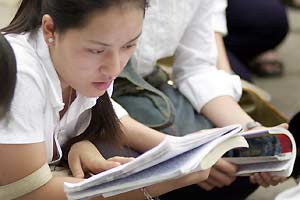The period from May to July is the most stressful time for students. This is when candidates enter the examination season after a long period of diligent studying. At this moment, students often neglect to take care of their health. Therefore, maintaining good health is also a way to help achieve high results in exams.
 |
(Image: VNE) |
Firstly, regarding nutrition, it is essential to consume a balanced diet rich in nutrients, meaning a diet that includes sufficient and balanced proteins, carbohydrates, fats, vitamins, and minerals. Meals should consist of items such as milk and dairy products; grains and starches (including products like bread, rice, various beans…); meats (such as chicken, fish, pork, beef…); and various vegetables and fruits.
The body requires approximately 2,000 calories per day, equivalent to about 6 bowls of rice + 150g of lean pork + 40g of cooking oil + 600g of vegetables and fruits. Folk wisdom often suggests that before exams, one should avoid eating duck eggs, especially fertilized ones, for fear of getting “duck egg” scores, and avoid bananas to prevent slipping on “banana peels,” while recommending eating a lot of beans to ensure success!
In fact, eating beans—especially soybeans—is beneficial as they contain a lot of protein, which helps prevent atherosclerosis. Moreover, fertilized duck eggs can be even better during examination season because they provide a complete and balanced source of proteins, carbohydrates, fats, minerals, and vitamins essential for forming a living organism without excess or deficiency. Additionally, fertilized duck eggs are rich in folic acid, which helps in blood formation (provided the eggs are properly inspected and thoroughly cooked!).
Furthermore, despite the study pressure, do not forget to set aside time for rest and relaxation to give your mind a break; otherwise, you might experience mental overload! Aim for 6 to 8 hours of sleep each night, and even if you’re busy during the day, try to take at least a 30-minute nap, as studies have shown that even a short afternoon nap can greatly aid in knowledge retention and productivity for the afternoon, refreshing your mind for work and study.
On the other hand, avoid stimulants such as strong tea, coffee, and tobacco (for students) or amphetamines, as they may provide temporary benefits, allowing you to stay awake to study all night, but will leave you feeling sluggish, tired, and drowsy the next day, making it hard to remember what you’ve studied. What’s more, prolonged use can lead to addiction.
If you feel overly fatigued, you can relax by listening to soothing music, watching comedies for a break, or performing some light exercise. You may also consider taking supplements such as Pharmaton (1 tablet/day, not recommended for children under 12) or Berocca (1 tablet/day).
Avoid staying up late the night before the exam; instead, go to bed early and relax so you can be mentally alert and perform well on the next day.
Additionally, it’s essential to maintain proper hygiene, especially during this hot season. Eat cooked food and drink safe water; avoid street food to prevent any gastrointestinal issues during the exam!
Dr. NGUYEN DINH SANG




















































